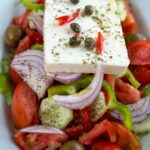The Mediterranean Diet: A Pathway to Health and Longevity
The Mediterranean diet is more than just a meal plan; it’s a lifestyle rooted in centuries-old eating habits found in countries bordering the Mediterranean Sea. Renowned for its health benefits, it has been linked to a lower risk of chronic diseases, enhanced brain function, and improved longevity. Let’s explore the 12 components of the Mediterranean diet and how you can incorporate them into your everyday life for optimal health.
1. Use Extra Virgin Olive Oil as the Main Added Fat
 Extra virgin olive oil (EVOO) is rich in monounsaturated fats and antioxidants, making it an essential part of the Mediterranean diet. Swap out butter and processed oils for this heart-healthy alternative. Drizzle it over salads, use it for cooking, or pair it with wholegrain bread.
Extra virgin olive oil (EVOO) is rich in monounsaturated fats and antioxidants, making it an essential part of the Mediterranean diet. Swap out butter and processed oils for this heart-healthy alternative. Drizzle it over salads, use it for cooking, or pair it with wholegrain bread.
2. Eat Vegetables with Every Meal
Aim to fill half your plate with vegetables at every meal. Leafy greens, tomatoes, cucumbers and capsicums are staples. The variety of colours and nutrients found in vegetables supports overall wellness and gut health.
The variety of colours and nutrients found in vegetables supports overall wellness and gut health.
3. Include Legumes Twice a Week
Legumes, such as lentils, chickpeas, and beans, provide a great source of plant-based protein, fibre, and essential vitamins. Even something as simple as baked beans on toast can help you meet this goal.
4. Eat Fish or Shellfish at Least Three Times a Week
Fish is a key part of the Mediterranean diet, particularly fatty fish like salmon, sardines, and mackerel, which are packed with omega-3 fatty acids. These healthy fats are excellent for brain function, heart health, and reducing inflammation.
5. Reduce Red Meat Consumption
Red meat is eaten less frequently in Mediterranean countries. When you do eat it, aim for smaller portions and choose lean cuts. White meats, such as chicken and turkey, are preferable.
6. Enjoy Fresh Fruit Every Day
Fresh fruit is the perfect natural dessert. Aim to eat 300g of fruit daily – equivalent to two servings. Rich in fibre, vitamins, and antioxidants, fruits like berries, apples, and citrus fruits are beneficial for digestion and overall health.
7. Snack on Nuts and Dried Fruits
Nuts are a nutrient-dense snack that offers healthy fats and protein. A handful of nuts, such as almonds, walnuts, or pistachios, along with dried fruits like figs or apricots, can help keep your energy levels stable throughout the day.
8. Consume Two Serves of Dairy Daily
Dairy is another important component of the Mediterranean diet but with a focus on fermented options like yogurt and cheese. Sheep and goat’s milk alternatives are more common in the Mediterranean and can be a gentler option for digestion compared to cow’s milk.
9. Enjoy Cheese in Moderation
Cheese, such as feta, is often enjoyed in Mediterranean dishes. It’s best to consume cheese in moderation, about three times a week. A small sprinkle on a salad or a modest slice of wholegrain bread can add flavour without overindulgence.
10. Incorporate Whole Grains
Whole grains like wholemeal bread, brown rice, and wholegrain pasta are excellent sources of energy and fibre. They keep you feeling full for longer and promote healthy digestion. Try incorporating a variety of grains into your meals for a well-rounded diet.
11. Sweets and Sugary Drinks in Moderation
In Mediterranean cultures, sweets are reserved for special occasions. If you’re craving something sweet, try making homemade treats with natural ingredients. This practice helps maintain blood sugar levels and keeps processed sugars to a minimum.
12. Eat Up to Three Eggs a Week
Eggs are a versatile food, but in the Mediterranean diet, they are typically enjoyed in moderation. Look for free-range or omega-3-enriched eggs for a more nutritious choice.
The Benefits of a Mediterranean Diet
Research has shown that following a Mediterranean diet can help reduce the risk of cardiovascular disease, type 2 diabetes, and certain cancers. It also supports brain health, potentially lowering the risk of dementia and cognitive decline. The high intake of fibre, healthy fats, and antioxidants promotes gut health and reduces inflammation, making it an ideal diet for people seeking long-term wellness.
By embracing these 12 components, you can experience the powerful health benefits of the Mediterranean lifestyle. Start small by introducing a few changes each week, and soon you’ll find that these habits become second nature.
Need help with your diet? Leah works with improving health and eating styles. With realistic goals and no judgement.
Call Leah today on 0425373773 to make an appointment either at her North Gosford NSW clinic or via Telehealth.
Here’s a simple one-week Mediterranean diet plan to help you get started.
This plan incorporates the 12 key components of the Mediterranean diet, focusing on nutrient-dense meals that are easy to prepare and satisfying.
Please note it is a basic meal plan. For a more specific diet for your needs speak with Leah.
Day 1
– Breakfast: Greek yogurt with fresh berries, a handful of walnuts, and a drizzle of honey.
– Lunch:Wholegrain toast topped with avocado, cherry tomatoes, and a poached egg. Drizzle with extra virgin olive oil.
– Dinner: Grilled salmon with quinoa and a side of roasted vegetables (zucchini, capsicum, eggplant).
– Snack:Apple slices with a small handful of almonds.
Day 2
– Breakfast: Oatmeal cooked with almond milk, topped with sliced banana and chia seeds.
– Lunch: Lentil salad with feta, cucumber, tomatoes, olives, and a lemon-olive oil dressing.
– Dinner:Grilled chicken breast with a side of brown rice and steamed broccoli.
– Snack: A handful of mixed nuts and a few dried apricots.
Day 3
– Breakfast: Wholegrain toast with hummus, cucumber, and a boiled egg.
– Lunch:Tuna salad with mixed greens, cherry tomatoes, cucumber, and extra virgin olive oil dressing.
– Dinner:Whole-wheat spaghetti tossed with extra virgin olive oil, garlic, chilli flakes, and prawns. Serve with a green salad.
– Snack:Greek yogurt with a drizzle of honey and walnuts.
Day 4
– Breakfast:Smoothie made with spinach, banana, almond milk, and chia seeds.
– Lunch:Baked beans on wholegrain toast with a side salad of mixed greens, cucumber, and cherry tomatoes.
– Dinner: Grilled mackerel with roasted sweet potatoes and sautéed spinach.
– Snack:A handful of almonds and dried figs.
Day 5
– Breakfast: Greek yogurt with sliced kiwi, pumpkin seeds, and a drizzle of honey.
– Lunch: Chickpea salad with tomatoes, cucumber, parsley, and a lemon-olive oil dressing.
– Dinner: Roast chicken with quinoa and a mixed vegetable stir-fry.
– Snack: A handful of walnuts and a piece of fresh fruit (apple or orange).
Day 6
– Breakfast: Wholegrain toast with mashed avocado, smoked salmon, and a sprinkle of sesame seeds.
– Lunch: Quinoa salad with feta, roasted vegetables, and a lemon-tahini dressing.
– Dinner: Grilled sea bass with a side of whole-wheat couscous and roasted asparagus.
– Snack: A small handful of mixed nuts and dried apricots.
Day 7
– Breakfast:Scrambled eggs with spinach, tomatoes, and extra virgin olive oil, served on wholegrain toast.
– Lunch: Mediterranean vegetable soup with wholegrain bread and a side salad.
– Dinner: Grilled chicken with a side of brown rice and a mixed vegetable salad (lettuce, cucumber, capsicum, feta, olives).
– Snack: Greek yogurt with a handful of fresh berries and walnuts.
Key Tips:
– Drizzle extra virgin olive oil over salads and vegetables.
– Snack on nuts and dried fruits throughout the day to keep your energy levels up.
– Drink plenty of water and enjoy a glass of red wine in moderation if desired.
– Incorporate a variety of vegetables, legumes, whole grains, and lean proteins throughout the week.
This Mediterranean diet plan is not only delicious but also packed with essential nutrients that will support overall health and well-being.


